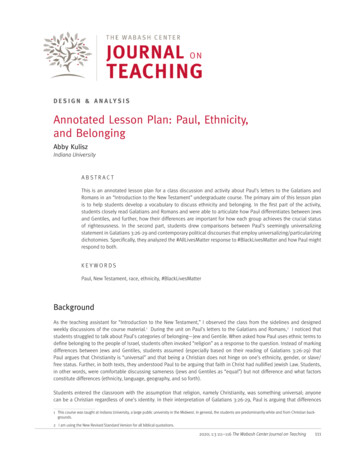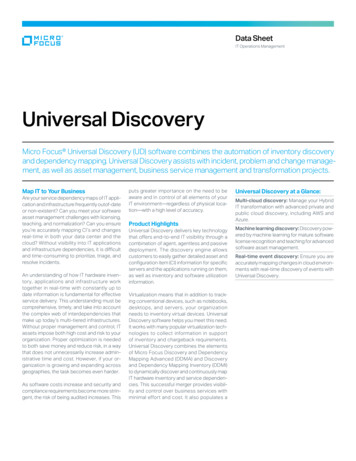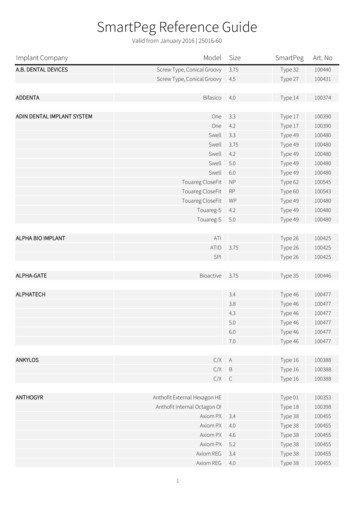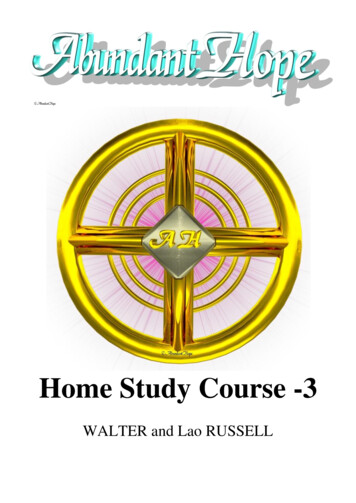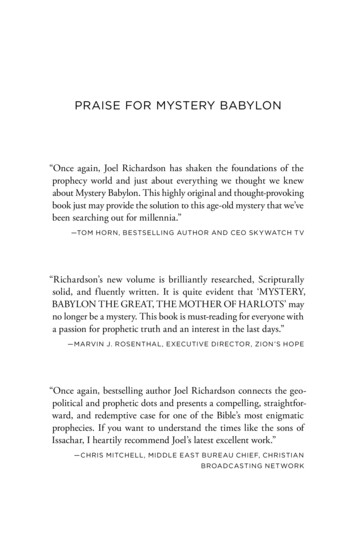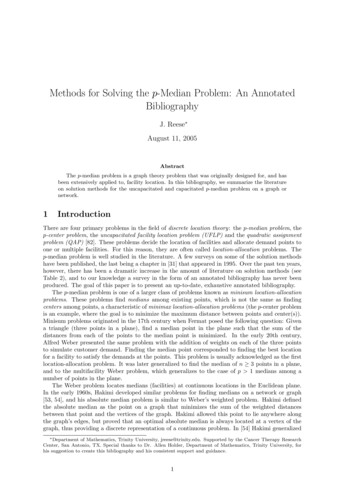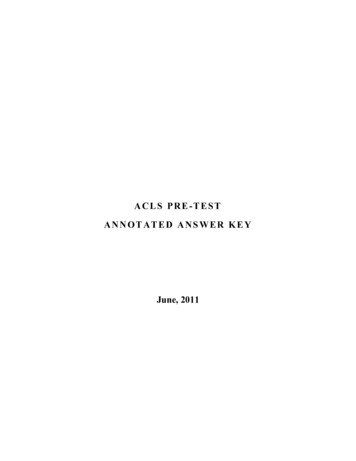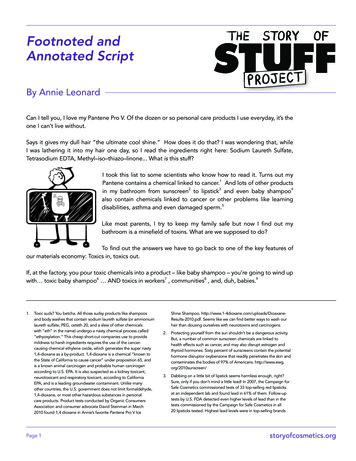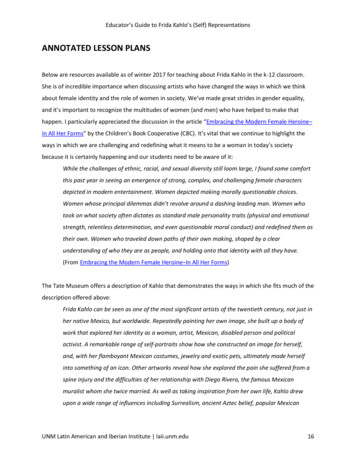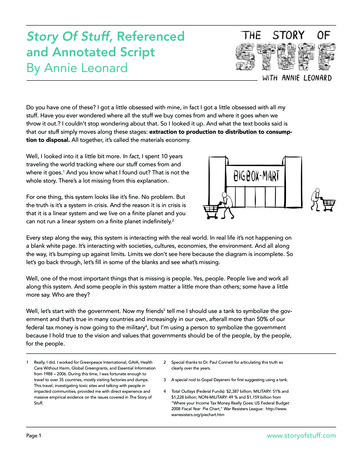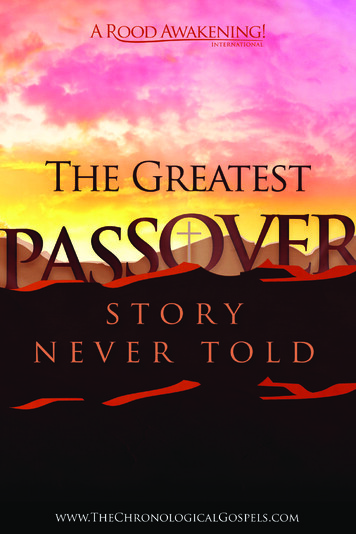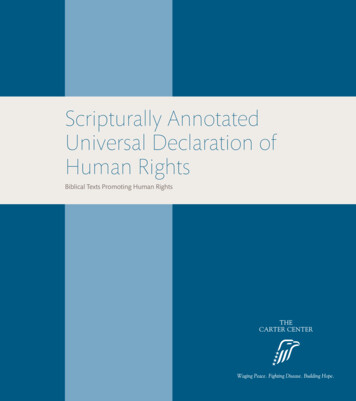
Transcription
Scripturally AnnotatedUniversal Declaration ofHuman RightsBiblical Texts Promoting Human Rights
IntroductionOn Dec. 10, 1948, the U.N. General Assembly adopted the Universal Declaration of HumanRights (UDHR), proclaiming inalienable rights to which all human beings are inherentlyentitled, regardless of race, color, sex, language, religion, political or other opinion, nationalor social origin, property, birth, or other status. The Carter Center hails this year’s 70thanniversary of the UDHR as an opportunity for all to reaffirm the universal values andenduring principles enshrined in the UDHR.The Carter Center works to support former U.S. President Jimmy Carter’s long commitmentto human rights, particularly the rights of women and girls. In his 2014 book, A Call toAction: Women, Religion, Violence, and Power, President Carter articulates many of hisproposals, including the engagement of religious leaders in this work, because, as he argues,the disproportionate violence, poverty, and discrimination that women and girls around theworld face is often caused by “the false interpretation of carefully selected religious texts anda growing tolerance of violence and warfare.”To mark of the 70th anniversary of the UDHR, The Carter Center, in collaboration withpartners, seeks to highlight the connection between ancient religious texts — in this case theBible — and the contemporary articulation of human rights found in the UDHR. To that end,this document hopes to inspire thought on the relationship between Christianity and itssupport for the human rights found in the UDHR.In this document, each UDHR article is accompanied by New Revised Standard Versionbiblical text, with a brief commentary bridging the two. This document’s modest objectiveis to initiate discussion on matters of biblical interpretation and human rights. It does notattempt to provide a determinate statement or in-depth scholarly explanations. There aremany differences in the interpretation of biblical passages related to particular human rights,and this document in no way means to be a definitive assessment of how biblical texts door do not align with the obligations enumerated in the UDHR. It is, however, intended toprovide Christian validation and confirmation of the basic values and principles that theUDHR espouses.Both the UDHR and the Bible were written in the language of their eras, with thegeneralized use of male pronouns. Time continues to demonstrate the power of languageand the importance of using language that is reflective of the present day. To ensureinclusivity, this document employs gender-inclusive language in its commentary.It is our hope that this document will provoke thought and generate fruitful deliberation,reconsideration, debate, and dialogue. We hope, too, that this deliberation, reconsideration,and dialogue will contribute to a more just, peaceful, and compassionate society for all.1
ARTICLE1All human beings are born free and equal in dignity and rights.They are endowed with reason and conscience and should acttowards one another in a spirit of brotherhood.Then God said, “Let us makehumankind in our image, accordingto our likeness; and let them havedominion over the fish of the sea, andover the birds of the air, and over thecattle, and over all the wild animalsof the earth, and over every creepingthing that creeps upon the earth.”In biblical terms, the moral status of human beings is exalted, in large part due tothe declaration first made in Genesis 1 that human beings are made in the divineimage. Being made in God’s image has been interpreted in a variety of ways. Onepattern of interpretation emphasizes certain God-like human capacities, suchas moral freedom, reason, conscience, and love. Another interpretive approachemphasizes the elevated moral status that goes with being made in God’s image,such as an intrinsic, or God-given, dignity. Finally, the fact that Genesis 1 appliesthe divine image to everyone speaks to a fundamental human equality — no onehas more of God’s image than anyone else.So God created humankind in his image,in the image of God he created them;male and female he created them.(Genesis 1:26-27)For you were called to freedom, brothers and sisters; only do not use your freedomas an opportunity for self-indulgence, but through love become slaves to oneanother. For the whole law is summed up in a single commandment, “You shalllove your neighbor as yourself.”(Galatians 5:13-14)Freedom, equality, and dignity are bestowed on all by virtue of being human,made in the image of God. In Galatians, the Apostle Paul reminds us that theserights are not earned but divinely ordained. Paul’s understanding of freedom isnot individualized license but the freedom to love and serve God and others.Paul’s use of the term “slave” does not mean that we are literally to enslaveothers or to become enslaved by others. Slavery here is a metaphor for a radicalcommitment to love and serve one another in community. Furthermore, thewarning against “self-indulgence” should not be understood as removal of thebenefits of God’s compassion or denial of the more fundamental assertion thateveryone, even the sinner, deserves equal respect. Hence, all are instructed to“love your neighbor as yourself.” Ultimately, the reason we are called to careabout human rights is because of God’s love for all human beings and our humanobligation to love others.2
3
ARTICLE2(1) Everyone is entitled to all the rights and freedoms set forth in thisDeclaration, without distinction of any kind, such as race, color, sex, language,religion, political or other opinion, national or social origin, property, birthor other status. (2) Furthermore, no distinction shall be made on the basis ofthe political, jurisdictional or international status of the country or territory towhich a person belongs, whether it be independent, trust, non-self-governingor under any other limitation of sovereignty.You shall not follow a majority inwrongdoing; when you bear witnessin a lawsuit, you shall not side withthe majority so as to pervert justice;nor shall you be partial to the poorin a lawsuit.In Exodus 23, the Israelites are given instructions on how to maintain justice forall. This text lists acts that must be and not be done, so as to prepare a safe andequitable space for all who inhabit the land. Note how this text aims at nurturinga community in which people will act justly, even when it is not in accordancewith their preferences or narrow self-interest. Exodus 23, therefore, ensures thateveryone is equally entitled to the rights set forth by the law, just as UDHR Article2 guarantees everyone’s entitlement to the rights and freedoms set forth in theUDHR without discrimination.When you come upon your enemy’s oxor donkey going astray, you shall bringit back.When you see the donkey of one whohates you lying under its burden andyou would hold back from setting itfree, you must help to set it free.You shall not pervert the justice dueto your poor in their lawsuits. Keep farfrom a false charge, and do not killthe innocent and those in the right,for I will not acquit the guilty. Youshall take no bribe, for a bribe blindsthe officials, and subverts the cause ofthose who are in the right.You shall not oppress a resident alien;you know the heart of an alien, foryou were aliens in the land of Egypt.(Exodus 23:2-9)4[F]or in Christ Jesus you are all children of God through faith. As many of you aswere baptized into Christ have clothed yourselves with Christ. There is no longerJew or Greek, there is no longer slave or free, there is no longer male and female;for all of you are one in Christ Jesus.(Galatians 3:26-28)These words of the Apostle Paul express so powerfully the equality and unityof all people in Christ, which can be understood to extend to all human beingsregardless of faith. There are no distinctions between human beings that couldever make any group of higher value than any other. Race and ethnicity; wealth,class, and status; gender and gender expression — none of these aspects thatmake us different from one another affects either our equality before God or ourentitlement to all rights and freedoms set out in the UDHR.
5
3ARTICLEEveryone has the right to life,liberty and security of person.When he came to Nazareth, where he had beenbrought up, he went to the synagogue on thesabbath day, as was his custom. He stood up toread, and the scroll of the prophet Isaiah was givento him. He unrolled the scroll and found the placewhere it was written:“The Spirit of the Lord is upon me,because he has anointed meto bring good news to the poor.He has sent me to proclaim release to the captivesand recovery of sight to the blind,to let the oppressed go free,to proclaim the year of the Lord’s favor.”(Luke 4:16-19)6In this passage, Jesus has returned to Galilee to begin ministry inhis hometown of Nazareth. As Jesus is filled with the power of theSpirit, he begins to read the prophecy of Isaiah 61. Through thistext, Jesus announces his ministry as led by “The Spirit of the Lord”and directed to the poor, the captives, and the oppressed — with amessage of liberation for all. Jesus’ mission was deeply concernedwith the affirmation of the life, liberty, and security of theoppressed. Jesus, and the Hebrew Bible before him, emphasizedthe rights and needs of the most oppressed, not because theymatter more than other people, but because they are the least ableto protect themselves from injustice, and their treatment, therefore,serves as a barometer for the broader application and attainmentof justice. As followers of Christ, we must, accordingly, concernourselves with the protection of the rights of all, so that everyperson may live life in its fullness.
ARTICLE4No one shall be held in slavery or servitude; slavery andthe slave trade shall be prohibited in all their forms.For freedom Christ has set us free.Stand firm, therefore, and do notsubmit again to a yoke of slavery.It must be admitted that the Bible contains numerous passages in which slavery isaccepted, its rules legislated, and slave obedience mandated. These texts had theunfortunate effect of providing fodder for the defense of slavery.(Galatians 5:1)However, it came to be understood that there was another way, a better way, tointerpret the Bible when it came to slavery. What matters is not stories, laws, andteachings that accept and legislate slavery, but the deeper spirit of the Bible thatemphasizes human dignity in the image of God, human equality before God, andlove of neighbor (all neighbors) as enjoined and modeled by Jesus Christ.UDHR Article 4 affirms that all human beings are equal and of infinite value. Everyhuman being is made in the image of God, and that sacred image should neverbe defiled by slavery or servitude. Christ died to set all humans free from slavery ofevery kind — physical slavery to other persons and spiritual slavery to beliefs thatdeny the love, power, and goodness of God.7
ARTICLE5No one shall be subjected to torture or to cruel,inhuman or degrading treatment or punishment.Now the men who were holding Jesusbegan to mock him and beat him;they also blindfolded him and keptasking him, “Prophesy! Who is it thatstruck you?” They kept heaping manyother insults on him.Jesus was tortured. This is easy to miss if the Passion Narratives are not readwith attention to the issue of torture. In fact, the lengthy trial narratives of thefour Gospel accounts are extremely valuable, albeit painful, accounts of tortureand other abuses. Jesus was struck, spat upon, beaten, flogged, mocked, andfinally plaited with a crown of thorns. Crucifixion itself was torture-execution, aslow, public mockery of a death intended to inflict the maximum emotional andphysical suffering on the victim. Torture or cruel, inhuman, or degrading treatmentwas, is, and always will be a grave offense againsthuman dignity and rights.(Luke 22:63-65)8
ARTICLE6Everyone has the right to recognitioneverywhere as a person before the law.So God created humankind in his image,in the image of God he created them;male and female he created them.Recognition of personhood is a corollary of recognition of human dignity and theimage of God. Personhood is thus a reflection of divinity, and it is equally sharedacross the human family. Though particularities of identity diversify us, we areall equal in creation. This is the basis for common human dignity and respect.Particularities of identity, such as class, race, and gender, both enrich personhoodand are not erased in our common humanity. Just as our particularity does notalter God’s grace toward us, neither should it negatively impact our treatment ofone another or who is recognized as a legal person. UDHRArticle 6 affirms that there is no human being who does notpossess rights and recognition before the law.(Genesis 1:27)Up to this point they listened to [Paul], but then they shouted,“Away with such a fellow from the earth! For he should not beallowed to live.” And while they were shouting, throwing offtheir cloaks, and tossing dust into the air, the tribune directedthat he was to be brought into the barracks, and orderedhim to be examined by flogging, to find out the reason forthis outcry against him. But when they had tied him up withthongs, Paul said to the centurion who was standing by, “Is itlegal for you to flog a Roman citizen who is uncondemned?”When the centurion heard that, he went to the tribune andsaid to him, “What are you about to do? This man is a Romancitizen.” The tribune came and asked Paul, “Tell me, are you aRoman citizen?” And he said, “Yes.”(Acts 22:22-27)This text from Acts is a valuable window into precisely howimportant it is that every person, everywhere, be recognizedbefore the law. Paul has enraged a crowd in Jerusalem andis about to be tortured under Roman authority. But, just intime, he invokes his citizenship, which protects him fromthat imminent flogging. UDHR Article 6, however, demandsthat each person be recognized as a person before thelaw everywhere, regardless of any consideration, includingcitizenship status.9
ARTICLE7All are equal before the law and are entitled without anydiscrimination to equal protection of the law. All are entitled toequal protection against any discrimination in violation of thisDeclaration and against any incitement to such discrimination.My brothers and sisters, do you withyour acts of favoritism really believein our glorious Lord Jesus Christ? Forif a person with gold rings and in fineclothes comes into your assembly, andif a poor person in dirty clothes alsocomes in, and if you take notice of theone wearing the fine clothes and say,“Have a seat here, please,” while to theone who is poor you say, “Stand there,”or, “Sit at my feet,” have you not madedistinctions among yourselves, andbecome judges with evil thoughts? You do well if you really fulfill theroyal law according to the scripture,“You shall love your neighbor asyourself.” But if you show partiality,you commit sin and are convicted bythe law as transgressors. For whoeverkeeps the whole law but fails inone point has become accountablefor all of it.This is an excerpt of a letter written by the Apostle James,probably to Palestinian Jewish Christians. Among otheradmonitions, James warns against partiality or differentialtreatment based on economic status. James’ intent is toshow that, in order to “fulfill the royal law,” you must “loveyour neighbor as yourself,” regardless of how much moneythey have.(James 2:1-4; 8-10)10Mirroring this passage, UDHR Article 7 says that the law isthe same for everyone and should be applied in the sameway to all. In no way should we discriminate on the basisof distinctions such as race, color, sex, language, or religion.It is imperative to ensure that all receive equal protectionof the law.
11
8ARTICLEEveryone has the right to an effective remedy by the competent nationaltribunals for acts violating the fundamental rights granted him by theconstitution or by law.God has taken his place in the divine council;in the midst of the gods he holds judgment:“How long will you judge unjustlyand show partiality to the wicked?SelahGive justice to the weak and the orphan;maintain the right of the lowly and the destitute.Rescue the weak and the needy;deliver them from the hand of the wicked.”They have neither knowledge nor understanding,they walk around in darkness;all the foundations of the earth are shaken.I say, “You are gods,children of the Most High, all of you;nevertheless, you shall die like mortals,and fall like any prince.”Rise up, O God, judge the earth;for all the nations belong to you!(Psalm 82)12Justice in judgment is a central demand of the Hebrew Bible.Leaders are called to dispense justice always, with specialconcern for the oppressed and defenseless. This passagepromises/threatens divine judgment against leaders who donot do justice. UDHR Article 8 sets the standard that states mustprovide sound structures that provide effective remedies forviolations of fundamental rights.
ARTICLE9No one shall be subjected toarbitrary arrest, detention or exile.Then the temple police went back tothe chief priests and Pharisees, whoasked them, “Why did you not arresthim?” The police answered, “Neverhas anyone spoken like this!” Thenthe Pharisees replied, “Surely you havenot been deceived too, have you?Has any one of the authorities or ofthe Pharisees believed in him? Butthis crowd, which does not know thelaw — they are accursed.” Nicodemus,who had gone to Jesus before, andwho was one of them, asked, “Our lawdoes not judge people without firstgiving them a hearing to find out whatthey are doing, does it?” They replied,“Surely you are not also from Galilee,are you? Search and you will see thatno prophet is to arise from Galilee.”(John 7:45-52)In John 7, the Pharisees wanted guardsto arrest Jesus during the Festival ofBooths. However, the guards did notarrest Jesus, finding no fault in him atthe time. When the Pharisees grewindignant, Nicodemus asked, “Our lawdoes not judge people without firstgiving them a hearing to find out whatthey are doing, does it?” Nicodemusand the guards tried to highlight thebasic legal principle that there must bea legitimate reason to arrest or detainsomeone for any period of time.UDHR Article 9 affirms that no arrest,detention, or exile may be arbitrary.13
ARTICLE10Everyone is entitled in full equality to a fair and public hearing byan independent and impartial tribunal, in the determination of hisrights and obligations and of any criminal charge against him.Then Jesus told them a parable abouttheir need to pray always and not tolose heart. He said, “In a certain citythere was a judge who neither fearedGod nor had respect for people. Inthat city there was a widow who keptcoming to him and saying, ‘Grant mejustice against my opponent.’ For awhile he refused; but later he said tohimself, ‘Though I have no fear of Godand no respect for anyone, yet becausethis widow keeps bothering me, I willgrant her justice, so that she may notwear me out by continually coming.’”And the Lord said, “Listen to what theunjust judge says. And will not Godgrant justice to his chosen ones whocry to him day and night? Will hedelay long in helping them? I tell you,he will quickly grant justice to them.And yet, when the Son of Man comes,will he find faith on earth?”This profound passage is commonly referred to as “The Parable of the PersistentWidow.” The widow is seeking justice against an opponent who she believes isharming her unjustly and in violation of Jewish law.(Luke 18:1-8)14The motives of the unjust judge are not fully specified. Even if he is simply lazy anduncaring, he is not fulfilling his responsibilities before God and his community.Yet the widow is persistent and continues to plead for a hearing. Her persistenceeventually pays off, and her request is granted.The unjust judge in this parable represents indifferent, or even abusive, powerin a society that does not value the full humanity of women. Such indifference,particularly with respect to women and societal attitudes expressed toward them,perpetuates violence and other forms of exploitation. Jesus, however, suggeststhat God is the antithesis of this unjust judge. God is a God of justice, and God willvindicate the oppressed, regardless of gender.Article 10 affirms that everyone — without regard to gender, race, or other uniquecharacteristic — is entitled to a fair and just judicial process.
11ARTICLE(1) Everyone charged with a penal offence has the right to be presumedinnocent until proven guilty according to law in a public trial at which hehas had all the guarantees necessary for his defense. (2) No one shall be heldguilty of any penal offence on account of any act or omission which did notconstitute a penal offence, under national or international law, at the timewhen it was committed. Nor shall a heavier penalty be imposed than the onethat was applicable at the time the penal offence was committed.So I took the leaders of your tribes, wise and reputableindividuals, and installed them as leaders over you,commanders of thousands, commanders of hundreds,commanders of fifties, commanders of tens, and officials,throughout your tribes. I charged your judges at that time:“Give the members of your community a fair hearing, andjudge rightly between one person and another, whethercitizen or resident alien. You must not be partial in judging:hear out the small and the great alike; you shall not beintimidated by anyone, for the judgment is God’s. Any casethat is too hard for you, bring to me, and I will hear it.”So I charged you at that time with all the thingsthat you should do.(Deuteronomy 1:15-18)15Here, Moses is speaking to the tribes of Israel. At thattime, Israel had grown in number and become so largethat it was not feasible for Moses to handle all its disputes.God had Moses establish a council of tribal leaders towhich community members could bring grievances. God’sinstruction through Moses to the tribal leaders also servesas instruction for leaders today. The rules are simple: 1) Giveeveryone a fair hearing; 2) Judge justly — whether citizenor non-citizen; and 3) Show no partiality, but listen to thewhole story. UDHR Article 11 guarantees the fundamental,minimum requirements for a fair trial: the presumption ofinnocence, the necessity of a public trial, the opportunityto offer an effective defense, and the application only oflaws and penalties that existed at the time the offensewas committed.
12ARTICLENo one shall be subjected to arbitrary interference with his privacy,family, home or correspondence, nor to attacks upon his honor andreputation. Everyone has the right to the protection of the law againstsuch interference or attacks.Give ear to my words, O Lord;give heed to my sighing.Listen to the sound of my cry,my King and my God, for to you I pray.O Lord, in the morning you hear my voice;in the morning I plead my case to you, and watch.For you are not a God who delights in wickedness;evil will not sojourn with you.The boastful will not stand before your eyes;you hate all evildoers.You destroy those who speak lies;the Lord abhors the bloodthirsty and deceitful.But I, through the abundance of your steadfast love,will enter your house,I will bow down toward your holy templein awe of you.Lead me, O Lord, in your righteousness because of my enemies;make your way straight before me.For there is no truth in their mouths;their hearts are destruction;their throats are open graves;they flatter with their tongues.Make them bear their guilt, O God;let them fall by their own counsels;because of their many transgressions cast them out,for they have rebelled against you.But let all who take refuge in you rejoice;let them ever sing for joy.Spread your protection over them,so that those who love your name may exult in you.For you bless the righteous, O Lord;you cover them with favor as with a shield.(Psalm 5)16
Article 12 of the UDHR specifies thatprohibited forms of attack are notlimited to attacks on the physicalintegrity of the person, such as theprohibition against torture found inArticle 5. Prohibited attacks againstthe person also include arbitraryinterference with a person’s privacy,family, home, and correspondence,as well as attacks on reputationand honor.17We see many cases of this type ofmistreatment described throughoutthe Hebrew Bible. There are manysongs of lament, like Psalm 5, thatdescribe the ways in which peopleare attacked in such areas of personalvulnerability.As seen in the psalmist’s lament, Godis always present to hear the cries ofthose who are treated maliciously.The psalmist asks for protection inwriting, “Give ear to my words, OLord O Lord, in the morning youhear my voice; in the morning I pleadmy case to you, and watch.” In theend, the psalmist bears witness toGod’s protection, writing, “For youbless the righteous, O Lord; you coverthem with favor as with a shield.” Allpeople should act to protect fromunjust assault the honor, privacy, andreputation of their neighbors.
ARTICLE13(1) Everyone has the right to freedom of movement and residence within theborders of each State. (2) Everyone has the right to leave any country, includinghis own, and to return to his country.Now the Lord said to Abram, “Go fromyour country and your kindred andyour father’s house to the land thatI will show you. I will make of you agreat nation, and I will bless you, andmake your name great, so that youwill be a blessing. I will bless those whobless you, and the one who curses youI will curse; and in you all the familiesof the earth shall be blessed.”There are many passages in the Bible that point to examples of individuals andfamilies leaving their countries, often under the perceived command of God. Inthis passage, we find that Abraham (Abram) was told to leave his native land foranother land God intended to show him. Abraham exercised what UDHR Article13 describes as a “right to freedom of movement” and the “right to leave anycountry.” Biblical teachings are easily read to go further — to call for compassion,and to create a demand for hospitality as an aspect of neighborly love.(Genesis 12:1-3)18
ARTICLE14(1) Everyone has the right to seek and to enjoy in other countries asylum frompersecution. (2) This right may not be invoked in the case of prosecutionsgenuinely arising from non-political crimes or from acts contrary to thepurposes and principles of the United Nations.When an alien resides with you in yourland, you shall not oppress the alien.The alien who resides with you shall beto you as the citizen among you; youshall love the alien as yourself, for youwere aliens in the land of Egypt: I amthe Lord your God.The strongest biblical mandates for caring for refugees and asylum seekers arepassages in the Mosaic Law. The crucial point the Hebrew Bible passages conveyis that God commands God’s people to receive into their lands those who aredisplaced, because they were once displaced people who received God’s mercy.This urges us to do unto others as our gracious God did unto us.(Leviticus 19:33-34)Do not neglect to show hospitality to strangers, for by doing that some haveentertained angels without knowing it.(Hebrews 13:2)Throughout the Hebrew Bible and the New Testament scriptures, there areconstant calls for hospitality. God provided hospitality to those in exile. Jesus (whowas also a refugee) calls for hospitality to those in need.As vulnerable people who have been cared for by God,believers are called to care for others. The idea that aperson would find security and then turn her or his backon those in need goes against scriptural teaching.19
ARTICLE15(1) Everyone has the right to a nationality. (2) No one shallbe arbitrarily deprived of his nationality nor denied theright to change his nationality.So she said, “See, your sister-in-law hasgone back to her people and to hergods; return after your sister-in-law.”But Ruth said,The story of Ruth and Naomi is an interesting account of religious and nationalidentity. Naomi, her husband, and two sons — all citizens of Bethlehem — movedto Moab to escape the famine in their homeland. Shortly after arriving in Moab,Naomi’s husband died, and her two sons married Moabite women, one of whomwas Ruth. Naomi’s two sons also died, but rather than finding another husband,Ruth chose to remain with Naomi and to leave her homeland to go to Bethlehemwith Naomi. Ruth tells Naomi, “Where you go, I will go; where you lodge, I willlodge; your people shall be my people, and your God my God.” As Ruth andNaomi traveled across borders, their stories give witness to what UDHR Article15 names as the right to change one’s nationality. Importantly, Article 15 alsorecognizes the right not to be arbitrarily deprived of one’s nationality.“Do not press me to leave youor to turn back from following you!Where you go, I will go;where you lodge, I will lodge;your people shall be my people,and your God my God.Where you die, I will die —there will I be buried.May the Lord do thus and so to me,and more as well,if even death parts me from you!”When Naomi saw that she wasdetermined to go with her, she said nomore to her.(Ruth 1:15-18)20
16ARTICLE(1) Men and women of full age, without any limitation due to race, nationalityor religion, have the right to marry and to found a family. They are entitled toequal rights as to marriage, during marriage and at its dissolution. (2) Marriageshall be entered into only with the free and full consent of the intendingspouses. (3) The family is the natural and fundamental group unit of society andis entitled to protection by society and the State.They said, “We will call the girl, and askher.” And they called Rebekah, and said to her,“Will you go with this man?” She said, “I will.”So they sent away their sister Rebekah and hernurse along with Abraham’s servant and hismen. And they blessed Rebekah and said to h
Christ died to set all humans free from slavery of every kind — physical slavery to other persons and spiritual slavery to beliefs that deny the love, power, and goodness of God. ARTICLE 4 No one shall be held in slavery or servitude; slavery and the slave trade shall be prohibited in all their fo
